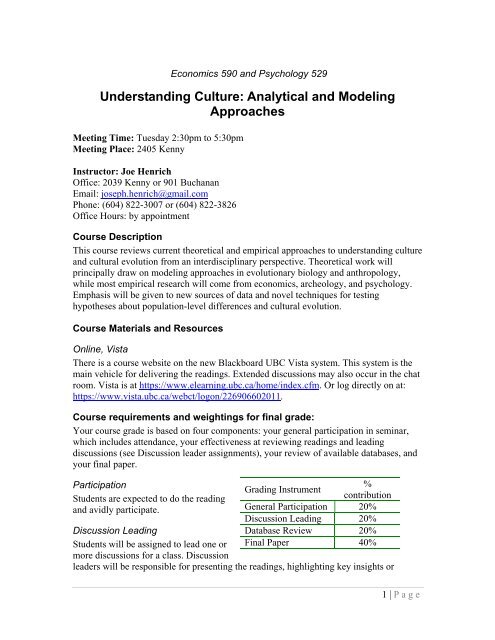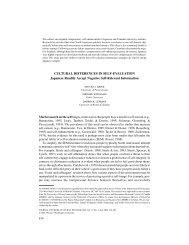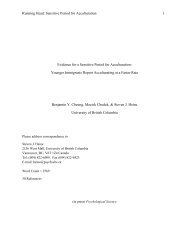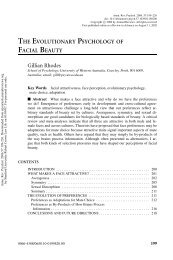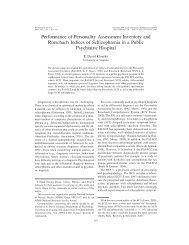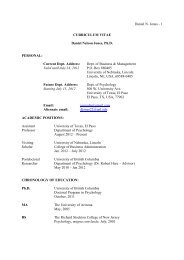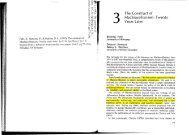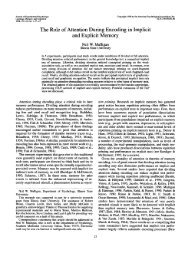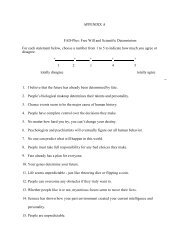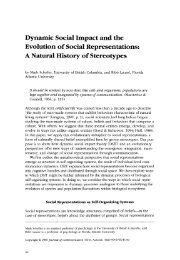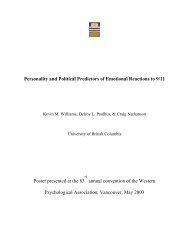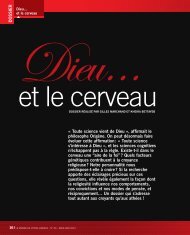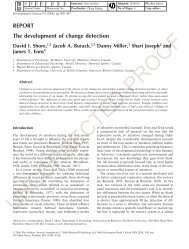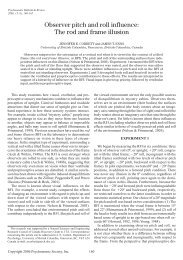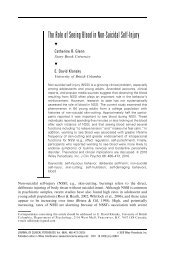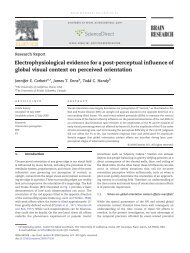Syllabus
Syllabus
Syllabus
Create successful ePaper yourself
Turn your PDF publications into a flip-book with our unique Google optimized e-Paper software.
Economics 590 and Psychology 529<br />
Understanding Culture: Analytical and Modeling<br />
Approaches<br />
Meeting Time: Tuesday 2:30pm to 5:30pm<br />
Meeting Place: 2405 Kenny<br />
Instructor: Joe Henrich<br />
Office: 2039 Kenny or 901 Buchanan<br />
Email: joseph.henrich@gmail.com<br />
Phone: (604) 822-3007 or (604) 822-3826<br />
Office Hours: by appointment<br />
Course Description<br />
This course reviews current theoretical and empirical approaches to understanding culture<br />
and cultural evolution from an interdisciplinary perspective. Theoretical work will<br />
principally draw on modeling approaches in evolutionary biology and anthropology,<br />
while most empirical research will come from economics, archeology, and psychology.<br />
Emphasis will be given to new sources of data and novel techniques for testing<br />
hypotheses about population-level differences and cultural evolution.<br />
Course Materials and Resources<br />
Online, Vista<br />
There is a course website on the new Blackboard UBC Vista system. This system is the<br />
main vehicle for delivering the readings. Extended discussions may also occur in the chat<br />
room. Vista is at https://www.elearning.ubc.ca/home/index.cfm. Or log directly on at:<br />
https://www.vista.ubc.ca/webct/logon/226906602011.<br />
Course requirements and weightings for final grade:<br />
Your course grade is based on four components: your general participation in seminar,<br />
which includes attendance, your effectiveness at reviewing readings and leading<br />
discussions (see Discussion leader assignments), your review of available databases, and<br />
your final paper.<br />
Participation<br />
Students are expected to do the reading<br />
and avidly participate.<br />
Grading Instrument<br />
%<br />
contribution<br />
General Participation 20%<br />
Discussion Leading 20%<br />
Database Review 20%<br />
Final Paper 40%<br />
Discussion Leading<br />
Students will be assigned to lead one or<br />
more discussions for a class. Discussion<br />
leaders will be responsible for presenting the readings, highlighting key insights or<br />
1 | P age
concerns, and energizing the discussion. This DL will lead off the class with a 15 minute<br />
presentation. Discussion leaders may meet with me prior to their discussion leading, but<br />
this is up to them to arrange.<br />
Database Review<br />
Students will also be asked to review the existing databases that are available for use.<br />
These may be publically available data sources or datasets created by specific<br />
researchers. Reviews should focus on (1) what information is available in the data source,<br />
(2) how was it collected (sampling), when, and by whom, (3) what are the shortcomings<br />
of the data source, (4) how can we access it, and (5) what questions might this data<br />
source address especially when combined with other data sources. Ideally, students will<br />
have actually obtained (e.g., downloaded and converted) the data source and worked with<br />
it.<br />
Every student will be required to review two data sources (1) one source assigned by the<br />
professor (from his list) and (2) one that the student locates on his or her own. Students<br />
with particular interests that might favor one or another database should make the<br />
professor aware of this.<br />
Final paper:<br />
The final paper will consist of three parts, and the absolute deadline is December 9 th . The<br />
subparts may be submitted individually, at any point during the semester.<br />
Part I. Design a set of experiments to confirm and extend empirical findings on “culture”<br />
from macro-level analyses. These may be findings from economics that we discussed or<br />
other findings. These experiments should (1) help detail the psychological, physiological<br />
or cognitive processes involved in creating the empirical patterns, and (2) contribute to<br />
explaining the variation (testing a theory for explaining the variation). A prime goal is to<br />
further develop theories of variation. Be clear about how your experiments accomplish<br />
this. Four pages is the target.<br />
Part II. Develop a simple, “first pass” test an existing psychological theory, idea, or claim<br />
and examine it using one (or preferably more) of the available global databases. Be clear<br />
about what your analysis tells us about this psychological theory, idea, or claim. Please<br />
also verify that no one has already done what you did. Five pages is the target. This will<br />
likely involve recombining data sets from different sources. Consider what additional<br />
data or analytical technique you’d need to really nail this down.<br />
Part III. Review either (a) the existing evidence for cumulative cultural transmission or<br />
(b) the available theory. After reviewing it, highlight the gaps and propose a way of<br />
filling the gaps, either theoretically, empirically, or both. Five pages here.<br />
Student must submit a paragraph describing their plans for Part I and II during<br />
November, or sooner. Students may want to submit early to “claim” certain ideas, or they<br />
can wait to be inspired by other people’s ideas. Each student, however, must pursue their<br />
2 | P age
own unique idea. This means that those who have not explained their basic plans by Nov<br />
22, will be asked to do so then.<br />
Schedule<br />
2<br />
3<br />
Sept 6<br />
Sept<br />
13<br />
Sept<br />
20<br />
Understanding Culture<br />
• Review of syllabus<br />
• Goals of the course<br />
• Value of interdisciplinary reading<br />
• Introductory lecture<br />
Evolution and Culture: How to theorize culture<br />
• Brown, G. R., Dickins, T. E., Sear, R. & Laland, K. N. (2011)<br />
Evolutionary accounts of human behavioural diversity<br />
Introduction. Philosophical Transactions of the Royal Society B-<br />
Biological Sciences: 366(1563): 313-324.<br />
• Chudek, M.& Henrich, J. (2011) Culture-gene coevolution, normpsychology<br />
and the emergence of human prosociality. Trends in<br />
Cognitive Sciences: 15(5): 218-226.<br />
• Rendell, L., Fogarty, L., Hoppitt, W. J. E., Morgan, T. J. H.,<br />
Webster, M. M. & Laland, K. N. (2011) Cognitive culture:<br />
theoretical and empirical insights into social learning strategies.<br />
Trends in Cognitive Sciences 15(2): 68-76.<br />
Discussion leader: Aiyana Willard<br />
Database presentation: Michael Muthukrishna (Mathematica)<br />
Special Guest: Maciej Chudek<br />
Culture, Economics and History<br />
• Henrich, J., Ensminger, J., McElreath, R., Barr, A., Barrett, C.,<br />
Bolyanatz, A., Cardenas, J. C., Gurven, M., Gwako, E., Henrich,<br />
N., Lesorogol, C., Marlowe, F., Tracer, D. P. & Ziker, J. (2010)<br />
Market, religion, community size and the evolution of fairness<br />
and punishment. Science 327: 1480-1484.<br />
• Nunn, Nathan. 2009. The Importance of History for Economic<br />
Development," Annual Review of Economics: 1 (1): 65-92.<br />
• Guiso, L., Sapienza, P. & Zingales, L. (2006) Does culture affect<br />
economic outcomes? Journal of Economic Perspectives 20(2):<br />
23-48.<br />
3 | P age
4<br />
5<br />
Sept<br />
27<br />
Oct 4<br />
Discussion leaders: Jack Eurich<br />
Database presentation: Rita McNamara (World Values Survey)<br />
Culture, Economics and History<br />
• Fernandez, Raquel Does Culture Matter. NBER working paper<br />
• Grosjean, Pauline A History of Violence: The Culture of Honor<br />
as a Determinant of Homicide in the US South," Mimeo<br />
University of San Francisco.<br />
Discussion leader: Jordan Levine<br />
Database presentation: Eric Thulin (Afro, Euro, Asiabarometer)<br />
Culture, Economics and History<br />
Pick atleast three of these to read<br />
• Nunn, N. and L. Wantchekon (forthcoming) The Slave Trade and<br />
the Origins of Mistrust in Africa. American Economic Review.<br />
• Algan, Y. and Cahuc, P. (2010) Inherited Trust and Growth<br />
American Economic Review 100: 2060-2092.<br />
• Alesina, A. & Angeletos, G. M. (2005) Fairness and<br />
redistribution. American Economic Review 95(4): 960-980.<br />
• Fisman, R. & Miguel, E. (2007) Corruption, norms, and legal<br />
enforcement: Evidence from diplomatic parking tickets. Journal<br />
of Political Economy 115(6): 1020-1048.<br />
Discussion leader: Michael Muthukrishna<br />
Database presentation: Jack Eurich (GSS and UNdata)<br />
6 Oct 11<br />
Cumulative Cultural Evolution<br />
• Henrich, J.& Henrich, N. (2010) The Evolution of Cultural<br />
Adaptations: Fijian food taboos protect against dangerous marine<br />
toxins. Proceedings of the Royal Society: Biological<br />
Sciences, 277, 3715-3724.<br />
• Henrich, J. (2004) Demography and Cultural Evolution: Why<br />
adaptive cultural processes produced maladaptive losses in<br />
Tasmania. American Antiquity 69(2): 197-214.<br />
• Powell, A., Shennan, S. & Thomas, M. G. (2009) Late<br />
Pleistocene Demography and the Appearance of Modern Human<br />
Behavior. Science 324(5932): 1298-1301.<br />
Discussion leader: Joe Henrich<br />
4 | P age
Cumulative Cultural Evolution<br />
• Boyd, R., Richerson, P.J., & Henrich, J. (2011) The Cultural<br />
Niche: Why social learning is essential for human adaptation.<br />
Proceeding of the National Academy of Sciences of the United<br />
States. 108, 10918-10925.<br />
• Enquist, M., Ghirlanda, S. & Eriksson, K. (2011) Modelling the<br />
evolution and diversity of cumulative culture. Philosophical<br />
Transactions of the Royal Society B: Biological Sciences<br />
366(1563): 412-423.<br />
7 Oct 18<br />
Discussion leaders: Michael Muthukhrisna<br />
Database presentation: Jordan Levine (HRAF and SCCS)<br />
Optional Reading<br />
• Enquist et. al. One cultural parent makes no culture. Animal<br />
Behaviour. 79, 1353-1362.<br />
• Aoki, K., Lehmann, L. & Feldman, M. W. (2011) Rates of<br />
cultural change and patterns of cultural accumulation in stochastic<br />
models of social transmission. Theoretical Population Biology<br />
79(4): 192-202.<br />
8 Oct 25<br />
Deep History and Religion<br />
• Putterman, L. (2008) Agriculture, Diffusion and Development:<br />
Ripple Effects of the Neolithic Revolution. Economica 75(300):<br />
729-748.<br />
• Fincher, C. L. & Thornhill, R. (2011) Parasite-stress promotes ingroup<br />
assortative sociality: the cases of strong family tries and<br />
heightened religiousity. Behavioral and Brain Sciences<br />
Discussion leader: Rita McNamara<br />
Database presentation: Aiyana Willard (Religion DBs)<br />
Special Guest: Damian Murray<br />
9 Nov 1<br />
Cultural Phylogenetics<br />
• Gray, R. D., Bryant, D., & Greenhill, S. J. (2010). On the shape<br />
and fabric of human history. Philosophical Transactions of the<br />
Royal Society B-Biological Sciences, 365(1559), 3923-3933.<br />
• Tehrani, J. J., & Collard, M. (2009). On the relationship between<br />
interindividual cultural transmission and population-level cultural<br />
5 | P age
diversity: a case study of weaving in Iranian tribal populations.<br />
Evolution and Human Behavior, 30(4), 286-300.<br />
• Nunn, C. L., Arnold, C., Matthews, L., & Mulder, M. B. (2010).<br />
Simulating trait evolution for cross-cultural comparison.<br />
Philosophical Transactions of the Royal Society B-Biological<br />
Sciences, 365(1559), 3807-3819.<br />
Optional<br />
• Fortunato, L. (2011) Reconstructing the History of Marriage<br />
Strategies in Indo-European—Speaking Societies: Monogamy<br />
and Polygyny. Human Biology 83(1): 87-105.<br />
Discussion leader: Erik Thulin<br />
Special Guest: Mark Collard<br />
Suggested Topics for Nov 8, Nov 15 and Nov 22<br />
10 Nov 8<br />
Marriage and Sex<br />
• Henrich, J., Boyd, R. & Richerson, P. J. (forthcoming) The<br />
Puzzle of Monogamous Marriage. Philosophical Transactions of<br />
the Royal Society B: Biological Sciences.<br />
• Schmidt DP (2005) Sociosexuality from Argentina to Zimbabwe:<br />
A 48-nation study of sex, culture, and strategies of human mating.<br />
Behavioral and Brain Sciences 28:247-311.<br />
11<br />
12<br />
Nov<br />
15<br />
Nov<br />
22<br />
Culture and Cognition<br />
• Henrich J, Boyd R, & Richerson PJ (2008) Five<br />
misunderstandings about cultural evolution. (Translated from<br />
English) Human Nature-an Interdisciplinary Biosocial<br />
Perspective 19(2):119-137 (in English).<br />
• Griffiths TL, Kalish ML, & Lewandowsky S (2008) Review.<br />
Theoretical and empirical evidence for the impact of inductive<br />
biases on cultural evolution. (Translated from eng) Philos Trans<br />
R Soc Lond B Biol Sci 363(1509):3503-3514 (in eng).<br />
TBA<br />
Cultural Neuroscience, Preferences and Sociality<br />
• Zaki—social influences alters preferences<br />
• Baumgartner T, Fischbacher U, Feierabend A, Lutz K, Fehr E.<br />
The neural circuitry of a broken promise. Neuron 2009 Dec<br />
10;64(5):756-70<br />
6 | P age
13<br />
Nov<br />
29<br />
• Spitzer M, Fischbacher U, Herrnberger B, Grön G, Fehr E. The<br />
neural signature of social norm compliance.<br />
• Ukraine learning time preference<br />
• Tabellini G. (2010) Culture and institutions: Economic<br />
development in the regions of Europe. Journal of the European<br />
Economic Association 8(4): 677–716.<br />
• Nunn, N., Giuliano, P. and A. Alesina (2011) Fertility and the<br />
Plough American Economic Review Papers and Proceedings:<br />
101, 499-503.<br />
Remaining students must explain their plans for Parts I and II of the final<br />
paper.<br />
CLASS OPTIONAL: The instructor is in Kyoto. I recommend the<br />
class still and discuss the course material.<br />
# Sources of Data<br />
1 Mathematica curated datasets<br />
2 World Values Survey<br />
http://www.worldvaluessurvey.org/<br />
3 Human Development Program<br />
http://hdr.undp.org/en/statistics/data/<br />
United Nations (UNdata)<br />
http://data.un.org/Explorer.aspx?d=25;<br />
http://unstats.un.org/unsd/default.htm<br />
4 Women Stats<br />
http://www.womanstats.org/<br />
5 Human Relations Area Files (HRAF)<br />
http://ehrafworldcultures.yale.edu/ehrafe/index.do?browseSelect=1&topSelect=0&<br />
context=main<br />
6 Standard Cross Cultural Sample (SCCS)<br />
http://eclectic.ss.uci.edu/~drwhite/courses/index.html<br />
7 Inter-university consortium for political and social research<br />
http://www.icpsr.umich.edu/icpsrweb/ICPSR/<br />
8 Religion<br />
http://dss.princeton.edu/cgi-bin/dataresources/newdataresources.cgi?term=1<br />
http://www.thearda.com/Archive/Browse.asp<br />
9 Genes<br />
http://genome.ucsc.edu/<br />
10 Afrobarometer<br />
http://www.afrobarometer.org/<br />
Eurobarometer<br />
7 | P age
http://ec.europa.eu/public_opinion/cf/index_en.cfm<br />
Asia barometer<br />
http://www.asianbarometer.org/<br />
11 Pew Research<br />
http://pewresearch.org/topics/<br />
8 | P age


